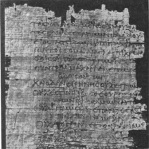From Psalms 146-150
Today’s psalm has a surprising ending. It is the second last psalm in the Psalter. It makes a closing statement like that of the book of Revelation in the NT when it pleads for the triumph of God’s kingdom and the final overthrow of forces opposed to God and to the community of believers. Jesus went to war against his enemies. He defeated them on the cross.
This post is part of my bible in a year series.
Overview
Ps 146.1-10; Book Five, Unknown; Put Not Your Trust in Princes
Ps 147.1-20; Book Five, Unknown; He Heals the Brokenhearted
Ps 148.1-14; Book Five; Unknown; Praise the Name of the LORD
Ps 149.1-9; Book Five; Unknown; Sing to the LORD a New Song
Ps 150.1-6; Book Five; Unknown; Let Everything Praise the LORD
Passage and Comments
Like many psalms this one begins in praise and song.
149 Praise the LORD! Sing to the LORD a new song, his praise in the assembly of the godly!
2 Let Israel be glad in his Maker; let the children of Zion rejoice in their King!
3 Let them praise his name with dancing, making melody to him with tambourine and lyre! (Ps 149:1–3)
The psalm is intended to be sung among the assembly of the godly. Presumably they are in or about the temple. They are worshipping the LORD. Sacrificing to him and singing in worship.
The psalmist calls Israel to be glad because the LORD has made them as a nation. They recognise the LORD as their king. They dance around and make music.
Have you ever danced while worshiping the LORD?
4 For the LORD takes pleasure in his people; he adorns the humble with salvation.
5 Let the godly exult in glory; let them sing for joy on their beds.
6 Let the high praises of God be in their throats and two-edged swords in their hands, (Ps 149:4-6)
They sing and dance for several reasons. The LORD feels good about them. They are his people, he loves to look after them.
He adorns the humble. Not the proud. The proud oppose the LORD. The humble seek him and take refuge in him. They listen when he speaks. They respect him as king.
He adorns the humble with salvation. The psalmist is using clothing imagery. Sometimes they wear their deeds and actions. Today they wear salvation.
The humble sing to God and they carry swords.
This changes what we think of the assembly. They are a war party, about to go into war. Where is this psalm heading? What does the assembly intend to do?
7 to execute vengeance on the nations and punishments on the peoples,
8 to bind their kings with chains and their nobles with fetters of iron,
9 to execute on them the judgment written! This is honor for all his godly ones. Praise the LORD! (Ps 149:7–9)
They want to go to war. To defeat the nations around them. To inflict punishment with the swords they carry.
They want to conquer kings by force, to judge them, to rule over them.
This is what they want. With the LORD’s help, if this assembly does as they intend. Their victory will be their honour. The godly ones will be victorious over their enemies. They praise the LORD in anticipation.
Story of Jesus
What would Jesus have thought about this psalm? As a good Jew he would have been familiar with the psalms. Have prayed and sung them. What kind of judgment and victory did he seek?
When Jesus sensed his hour was coming he said,
27 “Now is my soul troubled. And what shall I say? ‘Father, save me from this hour’? But for this purpose I have come to this hour. 28 Father, glorify your name.” Then a voice came from heaven: “I have glorified it, and I will glorify it again.” 29 The crowd that stood there and heard it said that it had thundered. Others said, “An angel has spoken to him.”
30 Jesus answered, “This voice has come for your sake, not mine. 31 Now is the judgment of this world; now will the ruler of this world be cast out. 32 And I, when I am lifted up from the earth, will draw all people to myself.” 33 He said this to show by what kind of death he was going to die. (Jn 12:27–33)
Jesus knew the ruler of this world was about to be cast out. He to was going out to war. But not with a sword in his hand. He went to war with a cross on his back.
15 He disarmed the rulers and authorities and put them to open shame, by triumphing over them in him. (Col 2:15)
He did this on the cross.
Copyright © Joshua Washington and thescripturesays, 2015. All Rights Reserved.

